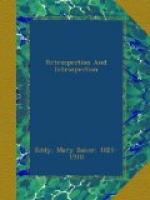As a mother, she was untiring in her efforts to secure the happiness of her family. She ever entertained a lively sense of the parental obligation, especially in regard to the education of her children. The oft-repeated impressions of that sainted spirit, on the hearts of those especially entrusted to her watch-care, can never be effaced, and can hardly fail to induce them to follow her to the brighter world. Her life was a living illustration of Christian faith.
My childhood’s home I remember as one with the open hand. The needy were ever welcome, and to the clergy were accorded special household privileges.
Among the treasured reminiscences of my much respected parents, brothers, and sisters, is the memory of my second brother, Albert Baker, who was, next to my mother, the very dearest of my kindred. To speak of his beautiful character as I cherish it, would require more space than this little book can afford.
My brother Albert was graduated at Dartmouth College in 1834, and was reputed one of the most talented, close, and thorough scholars ever connected with that institution. For two or three years he read law at Hillsborough, in the office of Franklin Pierce, afterwards President of the United States; but later Albert spent a year in the office of the Hon. Richard Fletcher of Boston. He was consequently admitted to the bar in two States, Massachusetts and New Hampshire. In 1837 he succeeded to the law-office which Mr. Pierce had occupied, and was soon elected to the Legislature of his native State, where he served the public interests faithfully for two consecutive years. Among other important bills which were carried through the Legislature by his persistent energy was one for the abolition of imprisonment for debt.
In 1841 he received further political preferment, by nomination to Congress on a majority vote of seven thousand,—it was the largest vote of the State; but he passed away at the age of thirty-one, after a short illness, before his election. His noble political antagonist, the Hon. Isaac Hill, of Concord, wrote of my brother as follows:—
Albert Baker was a young man of uncommon promise. Gifted with the highest order of intellectual powers, he trained and schooled them by intense and almost incessant study throughout his short life. He was fond of investigating abstruse and metaphysical principles, and he never forsook them until he had explored their every nook and corner, however hidden and remote. Had life and health been spared to him, he would have made himself one of the most distinguished men in the country. As a lawyer he was able and learned, and in the successful practice of a very large business. He was noted for his boldness and firmness, and for his powerful advocacy of the side he deemed right. His death will be deplored, with the most poignant grief, by a large number of friends, who expected no more than they realized from his talents and acquirements. This sad event will not be soon forgotten. It blights too many hopes; it carries with it too much of sorrow and loss. It is a public calamity.




